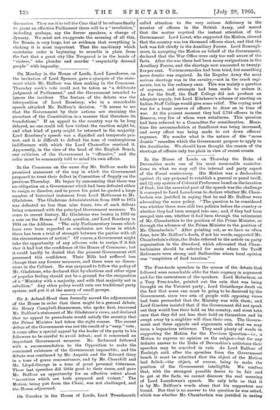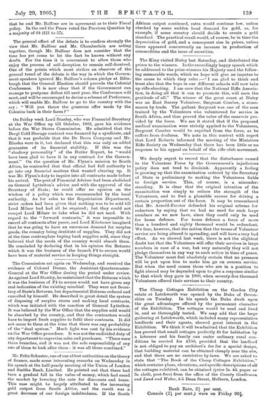The Free-trade speeches in the course of the debate that
followed were remarkable alike for their cogency in argument and for the earnestness of the speakers. Lord Robertson, as a Tory Free-trader, pointed out the ruin that was being brought on the Unionist party ; Lord Grimthorpe dwelt on the fact that some one must be going to be deceived by the Government, since two sets of people with opposing views had been persuaded that the Ministry was with them ; and Lord Goschen insisted that if the Government did not speak out they would lose their hold on the country, and must take• care that they did not lose their hold on themselves and be swept away by a mightier will than their own. The Govern- ment met these appeals and arguments with what we may term a loquacious reticence. They used plenty of words in supporting the Motion for the Previous Question—i.e., a Motion to express no opinion on the subject—but for any definite answer to the Duke of Devonshire's criticisms their speeches may be searched in vain. As Lord Balfour of Burleigh said, after the speeches from the Government bench it must be admitted that the object of the Motion had failed,—the object, of course, being to make the position of the Government intelligible. We confess that, with the strongest possible desire to be fair and to get at the facts, we cannot discover the real meaning of Lord Lansdowne's speech. He only tells us that it is by Mr. Balfour's words alone that his supporters are bound. But that is no answer to the question he was asked, which was whether Mr. Chamberlain was justified in saying
that he and Mr. Balfour are in agreement as to their Fiscal policy. In the end the Peers voted the Previous Question by a majority of 64 (121 to 57).







































 Previous page
Previous page